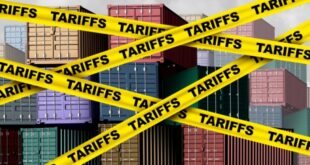The message from Wednesday’s Southern California Economic Forecast remained consistent: The Inland Empire is doing well. But, in the words of Manfred Keil, Ph.D., associate professor of economics at Claremont McKenna College, speaking on the regional economy, “… you don’t feel well because there are things that need to get done.”
Keil joined a host of other economists at Wednesdays seventh annual Economic Forecast, held at Ontario’s Citizens Business Bank Arena, to share the message of an overall healthy, albeit hesitant, economy. Although the forecast’s federal, state and regional speakers agreed on a currently healthy economic status their forecasts were tentative only because of the upcoming elections.
Jerry Nickelsburg, Ph.D. and senior economist at UCLA Anderson Forecast, acknowledged record level of employment in California and said employment was only some 300,000 to 350,000 shy of 2007’s all-time high. “California is one of the fastest growing states in the United States,” Nickelsburg said.
But Nickelsburg then pointed to the state’s dichotomy – “People want better, faster growth but don’t want more freeway congestion.”
Speaking on the national front Nickelsburg shared that auto sales had topped out, equipment sales were depressed and housing growth was slow throughout the United States – and he pointed to San Bernardino County as an example of the slow housing growth. But, “… compared internationally we’re doing exceptionally well,” said Nickelsburg. “The assumption is that Europe will economically recover…, he said with his voice trailing indicating some doubt in this assumption.
Looking to the national scene and a possible (Donald) Trump presidency, Nickelsburg expressed concern for the national economy on one front. “If you take five million people out of the U.S. (referring to Trump’s immigration stance), we’ll get a recession.” Conversely, looking to the Democrats’ support for an increasing minimum wage, he said, “…we’re starting to see wage gains which will only push interest rates up.”
Nickelsburg focused briefly on a possible growth industry throughout the country for those states with or those looking to legalize marijuana. Whereas Colorado, which recently legalized marijuana, “is getting out-of-town marijuana purchases” he questioned whether legalizing pot in California would have any economic benefit. Nickelsburg stated that, unlike Colorado, California’s economy was too large for marijuana to have more than a minuscule impact and that people might not spend money at amusement parks to stay home and smoke weed. That scenario could actually negatively impact the state’s economy.
But it was Keil who, speaking on the local economy, expressed the frustration felt by so many in the Inland Empire, saying, “If things are going so well, can we start fixing things?” as he pointed to schools, transportation, roads and other needed local improvements.
Keil pointed to the economic importance of the Inland Empire, further defined as Riverside, Ontario, San Bernardino and adjacent areas, saying it comprised the 13th largest gross domestic product area in the United States. “We have 4.2 million people and ten percent of California’s population. Don’t think we’re not important,” he told the audience of some 550 people.
But in spite of the economic importance of the region, Keil also shared the bad news. Whereas manufacturing has recovered approximately 13,500 jobs since 2007 it lost 45,000 jobs during the recession. Likewise, construction is up some 25,000 jobs but lost 55,000 jobs in the economic downturn.
The good news Keil shared was in logistics employment (transportation, warehousing, etc.) which is up 40,400 jobs over a recession loss of only 4,000; logistics employment is up some 35,000 jobs in the Inland region.
But, whereas logistics employment is up, manufacturing and construction are still lagging (and harken back to Nickelsburg’s concern regarding slow housing growth.) And, whereas leisure and hospitality along with education and healthcare are posting impressive employment gains these industries typically pay less than many other industries.
Capping the morning’s presentations was keynote presenter, author and former White House Director of Economic Policy in the George H. W. Bush administration, Todd Buchholz. Citing unemployment at five percent, an inflation rate at just 1.7 percent and the stock market at a near all-time high, Buchholz lamented, “You can’t go anywhere in this country and persuade people that those numbers actually reflect the health and well-being of the American political economy.”
Buchholz responded to his own lament by pointing to what he calls the “chopsticks mentality” – “I have a job but I haven’t had a raise since 1999.” He continued saying, “We live in the age of anxiety” while flashing a slide with a frozen frame from the 1976 movie, Network, with the mantra cry, “We’re mad as hell and we’re not going to take it anymore,” to illustrate his point.
Buchholz pointed to three things that continue to squeeze the American middle and lower-income populous – the international economy has created competition the American people never anticipated, commodity prices have risen for just about everything with the exception in the recent drop of gas prices and ever-increasing mergers and acquisitions have caused people to question the safety and security of their jobs.
“A baton has been jostled in our economy,” said Buchholz. “Consumers did not take up the baton…and they didn’t buy.” And whereas the low interest rates have been an attempt to spark buyers, it hasn’t worked, said Buchholz.
As for looking to the more distant future, Buchholz was the one who posed the question of the day: “What kind of a political environment and financial mark are we leaving to our children?”
 IE Business Daily Business news for the Inland Empire.
IE Business Daily Business news for the Inland Empire.

